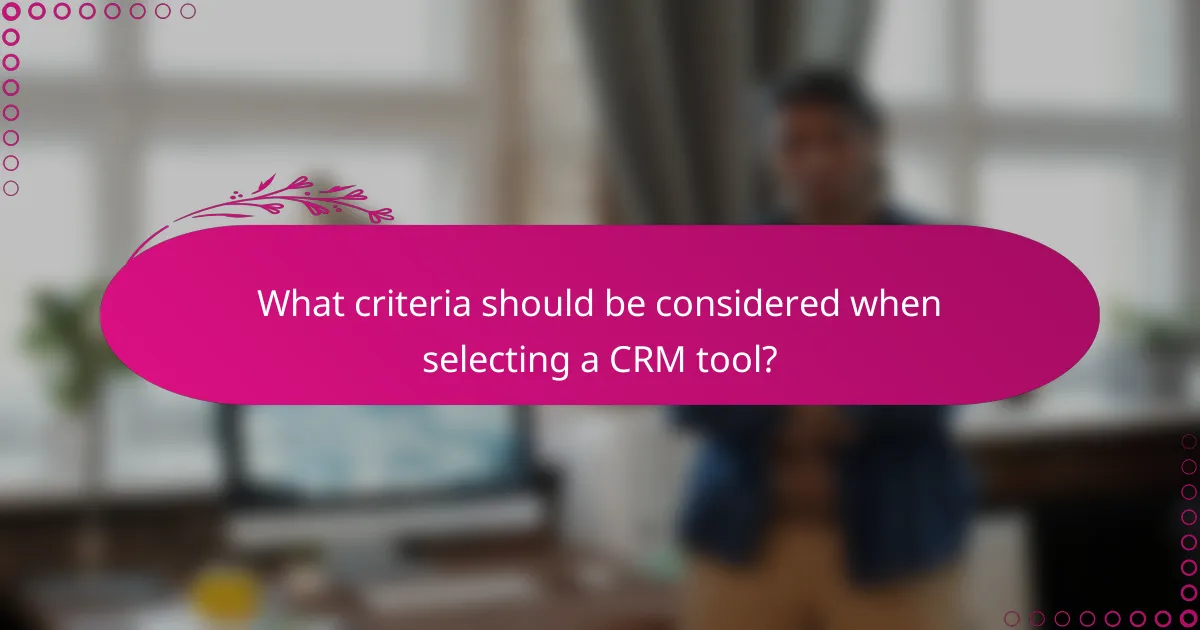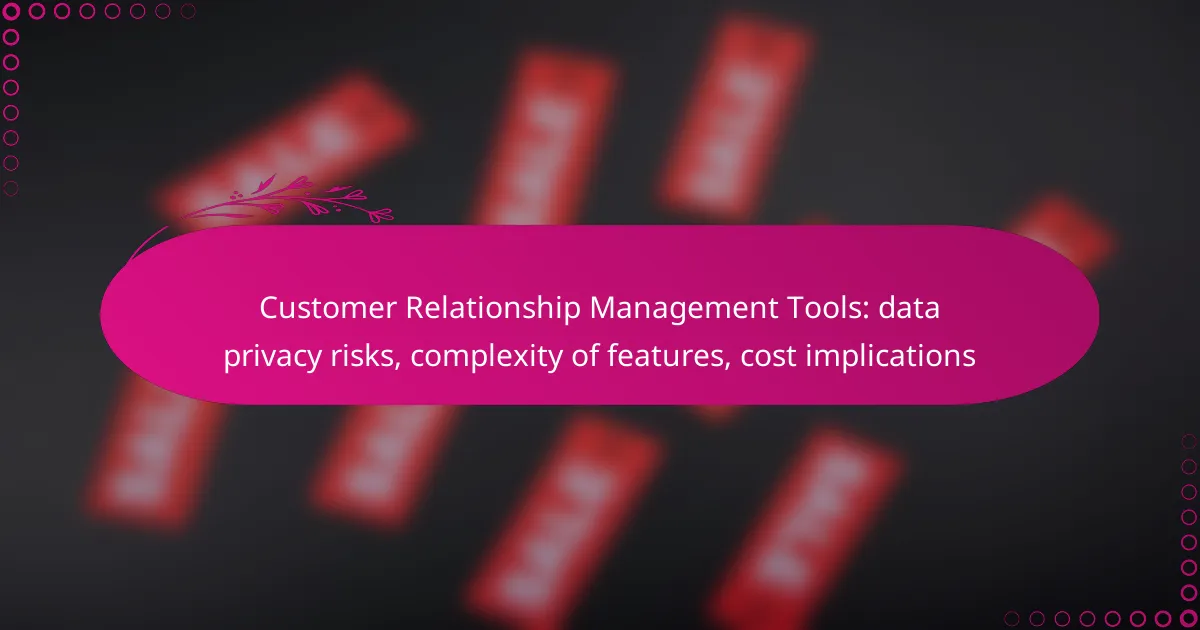Customer Relationship Management (CRM) tools are essential for managing customer interactions, but they come with notable data privacy risks that organizations must navigate to protect sensitive information. The complexity of features offered by these tools can enhance functionality while also presenting challenges in usability and integration. Additionally, the cost implications vary widely, making it crucial for businesses to assess pricing models and feature sets to ensure a worthwhile investment.

What are the data privacy risks of CRM tools in Australia?
CRM tools in Australia pose several data privacy risks, primarily due to the sensitive nature of customer information they handle. Organizations must be vigilant about protecting this data to avoid breaches and ensure compliance with local regulations.
Data breaches and unauthorized access
Data breaches can occur when unauthorized individuals gain access to customer information stored in CRM systems. This can happen through hacking, phishing, or inadequate security measures. Companies should implement strong password policies, two-factor authentication, and regular security audits to mitigate these risks.
Additionally, employee training on data handling and security protocols is essential. A significant portion of data breaches results from human error, making awareness and education critical components of a robust data protection strategy.
Compliance with Australian Privacy Principles
CRM tools must comply with the Australian Privacy Principles (APPs), which govern how personal information is collected, used, and disclosed. Organizations should ensure that their CRM systems are configured to support compliance with these principles, including obtaining consent for data collection and providing transparency about data usage.
Regular reviews of data handling practices and updates to privacy policies are necessary to align with any changes in legislation. Non-compliance can lead to significant penalties, making adherence to the APPs a priority for businesses using CRM tools.
Third-party data sharing concerns
Many CRM systems integrate with third-party applications, which can raise concerns about data sharing and privacy. Organizations should carefully evaluate the data-sharing practices of these third-party services to ensure they align with their privacy standards and the APPs.
Establishing clear agreements and conducting due diligence on third-party vendors can help mitigate risks. Businesses should also inform customers about any data sharing and obtain their consent where necessary to maintain trust and transparency.

How do CRM features impact complexity?
The features of Customer Relationship Management (CRM) tools significantly influence their complexity. A CRM with extensive features may offer advanced capabilities but can also lead to a steeper learning curve and integration challenges.
Integration with existing systems
Integrating a CRM with existing systems is crucial for seamless data flow and operational efficiency. If the CRM lacks compatibility with current software, it may require additional resources for custom integration, increasing complexity and costs.
Consider the types of systems your organization currently uses, such as ERP or marketing automation tools. A CRM that supports standard APIs or offers pre-built connectors can simplify integration and reduce implementation time.
User interface and experience
The user interface (UI) and overall user experience (UX) of a CRM can greatly affect how easily team members adapt to the tool. A complex UI may overwhelm users, leading to decreased productivity and potential errors in data entry.
Look for CRMs that prioritize intuitive design and user-friendly navigation. Conducting trials or demos can help assess how well the interface meets your team’s needs and whether it aligns with their technical proficiency.
Customization and scalability options
Customization and scalability are essential features that can add complexity to a CRM. While tailored solutions can meet specific business needs, they often require ongoing maintenance and updates, which can complicate user experience and increase costs.
Evaluate how much customization your organization truly needs versus what is available out-of-the-box. A scalable CRM that allows for gradual feature expansion can help manage complexity while accommodating growth without overwhelming users.

What are the cost implications of CRM tools?
The cost implications of Customer Relationship Management (CRM) tools can vary significantly based on the pricing model, additional features, and long-term value. Understanding these factors is essential for businesses to budget effectively and maximize their investment.
Subscription pricing models
Most CRM tools operate on subscription pricing models, which can be monthly or annual. Basic plans typically start at around $10 to $50 per user per month, while more advanced tiers can range from $100 to several hundred dollars per user monthly, depending on features and support. Businesses should evaluate their needs to choose the right plan that balances cost and functionality.
Some CRM providers offer tiered pricing, where additional features unlock at higher levels. This can include enhanced analytics, automation capabilities, or integrations with other software. It’s crucial to assess which features are necessary for your business to avoid overspending on unnecessary upgrades.
Hidden costs and add-ons
In addition to subscription fees, CRM tools may have hidden costs that can impact the overall budget. These can include charges for additional users, data storage, or premium support services. Businesses should inquire about these potential costs upfront to avoid surprises later.
Many CRM systems also offer add-ons for specific functionalities, such as advanced reporting or marketing automation. While these features can enhance the CRM experience, they can also significantly increase total costs. It’s advisable to carefully evaluate the necessity of these add-ons against their price to ensure a worthwhile investment.
ROI and long-term value
Calculating the return on investment (ROI) for CRM tools is vital for understanding their long-term value. A well-implemented CRM can improve customer retention, streamline processes, and increase sales, potentially leading to a ROI of several times the initial investment. Businesses should track key performance indicators to measure the effectiveness of their CRM system over time.
When considering long-term value, factor in not only the direct financial returns but also improvements in customer satisfaction and operational efficiency. Investing in training and support can further enhance the benefits of a CRM system, ensuring that staff can leverage its full potential for ongoing success.

What criteria should be considered when selecting a CRM tool?
When selecting a CRM tool, it’s essential to evaluate the feature set, vendor reputation, and data security measures. These criteria will help ensure that the chosen tool meets your business needs while safeguarding customer information.
Feature set and usability
The feature set of a CRM tool should align with your business requirements. Look for essential functionalities such as contact management, sales tracking, and reporting capabilities. Usability is equally important; a user-friendly interface can significantly reduce the learning curve and improve adoption rates among your team.
Consider whether the CRM offers customization options to tailor features to your specific processes. A tool that integrates well with existing systems can enhance efficiency and streamline workflows.
Vendor reputation and support
Research the vendor’s reputation in the market by reading reviews and case studies. A well-regarded vendor typically has a proven track record of reliability and customer satisfaction. Look for testimonials from businesses similar to yours to gauge the CRM’s effectiveness in your industry.
Support is crucial for ongoing success. Ensure that the vendor provides adequate customer service options, including live chat, phone support, and comprehensive documentation. A responsive support team can help resolve issues quickly and minimize downtime.
Data security measures
Data security is a critical consideration when selecting a CRM tool, especially with increasing regulations around data privacy. Ensure that the CRM complies with standards such as GDPR or CCPA, depending on your location and customer base.
Look for features like data encryption, regular security audits, and user access controls. A CRM that offers robust security measures will help protect sensitive customer information and maintain trust with your clients.

How do Australian regulations affect CRM tool usage?
Australian regulations significantly influence the use of Customer Relationship Management (CRM) tools, particularly regarding data privacy and protection. Organizations must comply with the Privacy Act 1988, which governs how personal information is collected, used, and disclosed.
Compliance with GDPR and local laws
While Australia has its own privacy laws, businesses that operate internationally may also need to comply with the General Data Protection Regulation (GDPR). This regulation applies to any organization processing the personal data of EU citizens, regardless of where the business is located. Companies should ensure their CRM systems are configured to meet both GDPR and Australian privacy requirements to avoid hefty fines.
To maintain compliance, businesses should regularly review their data handling practices, implement robust data protection measures, and provide clear privacy notices to customers. Utilizing CRM tools that offer built-in compliance features can simplify this process.
Impact on data storage and processing
Data storage and processing practices must align with Australian regulations, which emphasize the importance of securing personal information. Organizations are required to store data securely and only retain it for as long as necessary for its intended purpose. This may involve using cloud services that comply with local data protection standards.
Additionally, businesses should consider the implications of cross-border data transfers, as personal information may only be sent to countries with adequate privacy protections. It’s advisable to conduct regular audits of data storage solutions and ensure that any third-party CRM providers adhere to Australian regulations.

What are the emerging trends in CRM tools?
Emerging trends in Customer Relationship Management (CRM) tools focus on enhancing automation, data analysis, and customer engagement. These trends are driven by the need for businesses to improve efficiency, personalize customer interactions, and leverage data for strategic decision-making.
AI and machine learning integration
AI and machine learning are increasingly integrated into CRM tools to automate processes and enhance decision-making. These technologies can analyze customer data to predict behavior, segment audiences, and personalize marketing efforts. For example, AI can help identify potential leads by analyzing past interactions and customer profiles.
When considering AI integration, businesses should assess their data quality and the complexity of their CRM systems. Investing in AI capabilities can lead to significant improvements in customer engagement, but it requires a clear strategy and ongoing management to ensure effectiveness.
Enhanced data analytics capabilities
Enhanced data analytics capabilities in CRM tools allow businesses to gain deeper insights into customer behavior and preferences. Advanced analytics can help identify trends, measure campaign effectiveness, and optimize sales strategies. Companies can utilize dashboards and reporting tools to visualize data and make informed decisions.
To maximize the benefits of data analytics, organizations should focus on training staff to interpret data and act on insights. Regularly reviewing analytics can help businesses stay agile and responsive to changing customer needs.
Focus on customer experience personalization
A growing trend in CRM tools is the emphasis on personalizing the customer experience. This involves tailoring communications, offers, and services to individual customer preferences and behaviors. Personalization can lead to higher customer satisfaction and loyalty, as clients feel more valued and understood.
To effectively implement personalization, businesses should gather and analyze customer data from multiple touchpoints. Utilizing CRM features like customer journey mapping and targeted marketing campaigns can enhance the personalization effort. However, companies must also be mindful of data privacy regulations to maintain customer trust.
